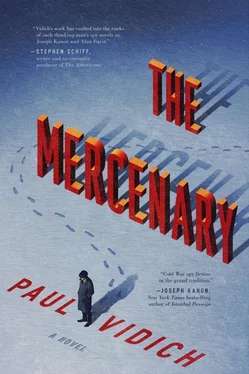“We are handling Posner. Be careful.”
“I am fully aware of the danger,” Petrov said. “I know the long list of the KGB’s counterintelligence successes, but there has never been the case of a man caught talking to his wife. Caught in a dead drop, yes. Caught in a brush pass, yes. Caught operating a clandestine radio, sure. Those are dangerous things, but there is no case of the KGB arresting a man because he happened to be strolling with his wife.” Petrov spat his opinion to the sidewalk.
He glared at Garin. “Our preparations are complete. Everything we own will stay in the apartment. Clothes, photographs, old letters, jewelry, money. Everything. It must look like we left for the weekend and planned to come back. When we are reported missing, the KGB will come. They will examine everything, even the dust. As you requested, Olga has bought four first-class tickets to both cities.
“We have set out clothing so we can change our appearance. We will leave the apartment in track suits. In the metro station bathroom, she will change into a dress, high heels, and a blond wig. You will know me when we get to the station because I will be wearing wire-rim glasses, a German suit, and paisley tie. Our appearance will match the identity documents. They are very good. Olga was impressed. They made her feel better.”
“Have you told your son?”
“He is five years old. We only have a chance if he genuinely doesn’t know.”
“He has a new name.”
“Olga has a pretend name game we will play. But he will also be sedated. He will sleep on the train and again when we cross the border. He will be asleep at my side inside the compartment.”
“What haven’t you thought of?”
Petrov spat. “What haven’t you thought of? We will play our part. It’s up to you now.” He paused. “The story I heard was that Zyuganov made it to the border, and he was crossing alone.”
“I will be in the car with you. What about your wife? Has she agreed?”
“It depends on the day. She is worried about the boy. The sedatives will calm her, too.” Petrov looked at Garin for a moment. “If I am arrested, I want you to look after my son. He is smart, clever, and he should have a full life, even if I am not there. He’s a good kid.”
“Nothing will happen.”
“Something always happens,” he snapped. “I want to hear you say it.”
“He’ll be safe. You have my word.”
“Good. It might be your first decent act.” Petrov was silent again. “How do I know you won’t make the same mistake with me that you made with Zyuganov?”
“I may make a mistake, but it won’t be the same mistake.”
Petrov laughed. “Some sense of humor you have. The saddest men have the best jokes.” He looked at Garin. “I don’t know what you’re thinking. I don’t even know your name. Sukin syn. ” Son of a bitch.
Petrov raised his face to the warming sun again. “This you don’t know,” he said. “I will be bringing with me a technical report that will be of great interest to your Pentagon. We have built an ingenious weapon that can destroy your early-warning satellites, making you vulnerable to a nuclear first strike.” He smiled. “It’s why we win chess tournaments but can’t run a factory. A special type of concentrated intelligence.
“You look interested. I too was interested when I first read it. Space is different. A world without gravity, and conventional explosives don’t do well, and then there is the problem of objects approaching each other at very high angular speeds. Pursuit curves are either the dog’s pursuit, where the dog chases its prey by running straight at it, or the wolf’s, where the wolf aims at a point in front of its moving prey. Neither works for the entire flight of an attack missile. Too much fuel is required, and it is impossible to be exactly accurate over the great distances the missile must travel.
“I am an engineer by training. For an engineer, solving a big problem is very special. And the way we solved this crazy problem, well, the best way to solve a crazy problem is with a crazy solution.” He looked at Garin. “How did we do it? Huge filament nets studded with ball bearings, which hit the satellite at a speed of nine hundred meters per second. You won’t know we’ve launched a nuclear attack until it is too late.”
Petrov stood. “And just to be certain I have the CIA’s full attention, and its best thinking on my escape, I will carry the film with me when I cross the border.”
He started to walk along the muddy path, but arriving at a gate a few yards away, he happened to turn. The instinct of a man who knew he was being watched. Two militia stood on a bridge across the swollen creek.
“A woman!” he shouted, nodding to Garin, who had slumped on the bench. He flicked his cigarette into the mud, adding, “Always a woman.” He opened the gate and was gone.
Garin waited until the two militia had made their way back to the Ferris wheel. Then he too passed through the gate and walked in the opposite direction of Petrov.
GARIN LEFT THE APARTMENT AND set out to arrange the final details of the exfiltration. He had his shoes shined inside the entrance to the metro station, and when he was done and ready to pay, he asked the boy if he could buy one tin of black boot polish. When the boy hesitated, Garin added twenty more kopeks to his offer. Next, he found a secondhand shop that sold eyeglasses. After trying on several, he chose a wire-rim pair that pinched the bridge of his nose—the careless choice of a tekhnikum instructor. He added to his teacher’s appearance with an old coat he convinced a pensioner to sell.
He made his last purchase at the train station. He paid cash for two pairs of round-trip tickets for travel on successive nights from Moscow to Uzhgorod. For identification, he presented the Soviet passport Technical Services had created under another name. When he left the station, he made sure not to hurry. He knew he was being hunted. He settled into the persona of a Muscovite minding his own business, making his way home in the bustling street. He ignored sounds that made pedestrians around him jump, and he was careful not to look at the militia who watched him.
There was one more errand. The Russian Orthodox church at 25 Mayakovsky Street was small and rose-colored, with a sad, cracked bell tower. It sat between taller, more robust buildings on a quiet side street, lost in time and neglected. He entered through the wooden door and found himself facing a dark nave with a single flickering candle. Cold dampness filled the unheated space. The shadows of evening added their depressing tone to the unused sanctuary—and to the dismal problems of his challenge. No one had ever been successfully exfiltrated from the Soviet Union. Below an icon of Madonna and child, in the gap between the wall and the cabinet that General Zyuganov had used for his dead drops, he found Ronnie’s envelope.
Garin inspected the paper of the document. One edge was torn, the ink was faded to give the appearance of age, and the surface was worn as if repeatedly handled. He verified the Russian paper stock. A perfect forgery, unless you knew what to look for. He looked in the envelope for the second document, but it was missing. He looked behind the cabinet and on the floor but found nothing. Shit. He wrote a note for Ronnie and placed it where he knew she’d find it.
He turned to leave but stopped briefly and placed his fingers on the icon’s delicate silver frame, submitting to his urge to test the relic’s powers. Then he stopped. She would come, or she wouldn’t. No prayer would change that fact.
* * *
GARIN STOOD AT Natalya’s third-floor apartment, raising his hand to knock, when suddenly the door opened and Natalya stood before him, horrified.
Читать дальше












